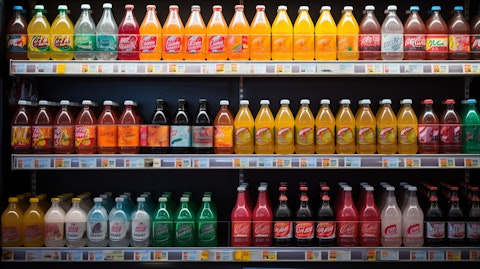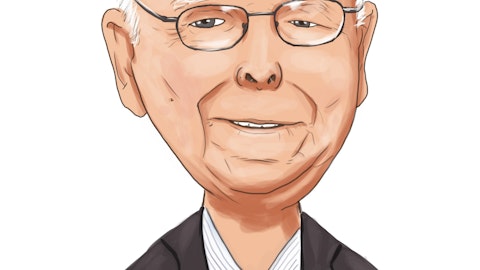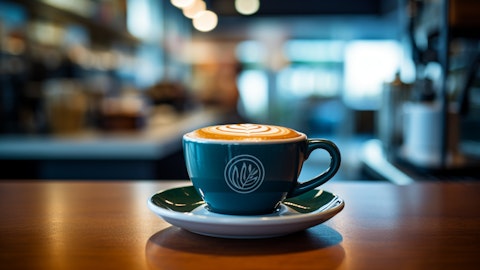In this piece, we will take a look at the functional beverages market, its size, some recent trend, and the biggest companies in the U.S. If you want to skip our overview of this industry, then you can take a look at 5 Small-Cap Functional Beverages Companies in the U.S.
Ever since they were able to utilize chemistry to produce food products, humans have been inventing products to boost their performance. Whether it’s everyday stimulants such as coffee or illegal substances such as anabolic steroids, there are several substances that enable people to concentrate more and improve their productivity or athletic performance.
One such product category is the functional beverages segment. Functional beverages are a broad category, and some individual products that they include are energy drinks, tea, coffee, vitamin supplements, and even mineralized water. The premise behind these beverages is to supplement human nutrition and provide micronutrients, minerals, and vitamins that might be absent from a regular diet.
In terms of monetary value, the functional beverages market is quite sizeable. Research from Future Markets Insights shows that this market was worth a whopping $156 billion as of 2022 end and it is slated to grow to $164 billion by the end of this year. From 2023 end to 2033, the research firm expects the market to grow at a compounded annual growth rate (CAGR) of 5.4% to be worth $277 billion by the end of the forecast period. This makes the functional beverage market one of the biggest in the world, and some drivers behind this rapid growth include a rising health trend in younger generations such as millennials and Gen Z. Additionally, an aging global population is also expected to stimulate demand, but constraints such as the need to ensure end to end supply chain visibility are some risks that can hamper market performance.
One of the more popular segments of the functional beverage market is the energy drink market. These products are quite popular among athletes and graduate students alike, as both are eager to maximize their performance to beat out the competition or deadlines set by their professors and universities. According to our research part of 10 Biggest Energy Drink Companies in the World, the energy drink market was worth $54.8 billion in 2020, and it is expected to grow at a CAGR of 8.1% between 2022 and 2030. Combining this with our analysis of the functional beverage market above, the energy drink segment accounts for more than a third of the broader revenue pie and its growth rate is also significantly faster than the broader market. Additionally, and as is the case with other industries such as construction and travel, Asia Pacific is expected to lead the energy drink market growth in the future. In particular, China is expected to post a 10% CAGR between 2020 and 2027, with a final market value of $33.7 billion by 2027.
But what about stocks? After all, if the functional beverages and energy drink market is slated for massive growth, then it might be wise to pick out the right stocks and wait patiently for long term share price appreciation. Well, if you were wondering about the top energy drink stocks, you’re in luck as we covered them in detail as part of our coverage of the 12 Biggest Energy Drink Stocks in the US. This list ranked the biggest energy drink companies in America by their market capitalization and found that the three biggest American energy drink companies were The Coca-Cola Company (NYSE:KO), PepsiCo, Inc. (NYSE:PEP), and Monster Beverage Corporation (NASDAQ:MNST).
Looking at this, it’s clear that the functional energy drink market is also dominated by big beverage companies, just like AI is dominated by mega technology giants such as Microsoft Corporation (NASDAQ:MSFT) and Alphabet Inc. (NASDAQ:GOOG). This is unsurprising as larger firms have considerable resources at their disposal, and they can often match the operational scale of smaller companies by setting up smaller business divisions.
Functional drinks are discretionary products, which means that their business operations are sensitive to high inflation. People are likely to focus on core purchases such as medicine and chicken if inflation is high, as they choose to skip their Red Bull for the next shopping run. Therefore, as inflation in the U.S. is still high (despite notably falling in the wake of the Federal Reserve’s rapid interest rate hikes, it’s important to look at what the companies themselves are experiencing.
On this front, here’s what the management of Monster Beverage Corporation (NASDAQ:MNST) had to say during its third quarter of 2023 earnings call:
The company continues to have market share leadership in the energy drink category for all outlets combined in the United States in both the 13-week and four-week periods ended October 21, 2023. According to Nielsen, for the four weeks ended October 21, 2023, sales in dollars in the energy drink category in the convenience and gas channel, including energy shots in dollars increased 6.7% over the same period the previous year. Sales of the company’s energy brands, excluding Bang, increased 4.5% in the four-week period in the convenience and gas channel. Sales of Monster increased by 1.9% over the same period versus the previous year. Reign sales increased 35.2%, NOS was up 9.7% and Full Throttle was up 7.8%.
With these details in mind, let’s take a look at the biggest functional beverage companies in the U.S.

A shelf filled with a variety of bottles of energy drinks, juices, and sodas in a convenience store.
Our Methodology
To compile our list of the biggest functional beverage companies in the U.S., we ranked all companies that sell the products in America and ranked them by their market capitalization.
Functional Beverages Market Size, Share, & Trends: Biggest Companies in the U.S.
1. The Coca-Cola Company (NYSE:KO)
Latest Market Capitalization: $247.55 billion
The Coca-Cola Company (NYSE:KO) is one of the biggest carbonated beverage companies in the world. It has made several investments in the functional beverage sector over the years, including a $20 million investment in 2019 that led to the launch of Coca-Cola Energy.
During Q2 2023, 61 out of the 910 hedge funds profiled by Insider Monkey were The Coca-Cola Company (NYSE:KO)’s investors. In Q3, the biggest shareholder was Warren Buffett’s Berkshire Hathaway due to its $22.3 billion stake.
2. PepsiCo, Inc. (NYSE:PEP)
Latest Market Capitalization: $229 billion
PepsiCo, Inc. (NYSE:PEP) is Coca Cola’s only rival in the global beverages space. And just like Coca-Cola, PepsiCo, Inc. (NYSE:PEP) also has its own set of functional drinks which include the well known Gatorade energy drink and Mountain Dew.
By the end of this year’s June quarter, 68 out of the 910 hedge funds part of Insider Monkey’s research had held a stake in the company. PepsiCo, Inc. (NYSE:PEP)’s largest hedge fund shareholder in the September quarter was Ken Fisher’s Fisher Asset Management as it owned $1.3 billion worth of shares.
3. Monster Beverage Corporation (NASDAQ:MNST)
Latest Market Capitalization: $57 billion
Monster Beverage Corporation (NASDAQ:MNST) is a pureplay energy drink company headquartered in Corona, California. The firm posted a strong set of earnings results in November 2023 that saw its revenue grow by 14% annually and profit jump by a whopping 40%. The stock is rated Buy on average and analysts have set an average share price target of $60.71.
After digging through 910 hedge fund portfolios for their second quarter of 2023 investments, Insider Monkey discovered that 44 had bought and owned Monster Beverage Corporation (NASDAQ:MNST)’s shares. In Q3, the firm’s biggest investor in our database was Neil C. Bradsher’s Broadwood Capital as it owned 8.5 million shares that are worth $450 million.
4. Keurig Dr Pepper Inc. (NASDAQ:KDP)
Latest Market Capitalization: $44.3 billion
Keurig Dr Pepper Inc. (NASDAQ:KDP) is a popular American carbonated beverages company headquartered in Burlington, Massachusetts. Over the years, the firm has slowly expanded its presence in the functional beverage market as well through working with several brands such as Xyience Energy.
Insider Monkey took a look at 910 hedge fund holdings for this year’s June quarter and found that 40 had owned a stake in the company. Keurig Dr Pepper Inc. (NASDAQ:KDP)’s largest hedge fund shareholder in the September quarter was Ken Griffin’s Citadel Investment Group due to its $206 million stake.
5. Danone S.A. (EPA:BN.PA)
Latest Market Capitalization: $40.64 billion (1EUR = 1.09USD)
Danone S.A. (EPA:BN.PA) is a large French food company that is also one of the oldest on our list since it was set up in 1899. The firm has a global presence and operates in North America, Europe, Asia Pacific, and other lucrative regions. Its American business division is called Danone North America, and the firm established its American base in 1942. The products that Danone S.A. (EPA:BN.PA) sells in the U.S. include special waters and dairy beverages. This segment was also quite profitable during the first quarter of 2023, as sales grew by 16% due to strong market reception of coffee and other products.
Click here to continue reading and check out 5 Small-Cap Functional Beverages Companies in the U.S.
Suggested articles:
- Dividend Champions List Ranked By Yield: Top 30
- Ken Fisher Portfolio: 12 Biggest Positions
- 18 Best-Performing Dow Stocks in 2023
Disclosure: None. Functional Beverages Market Size, Share, & Trends: Biggest Companies in the U.S. is originally published on Insider Monkey.





